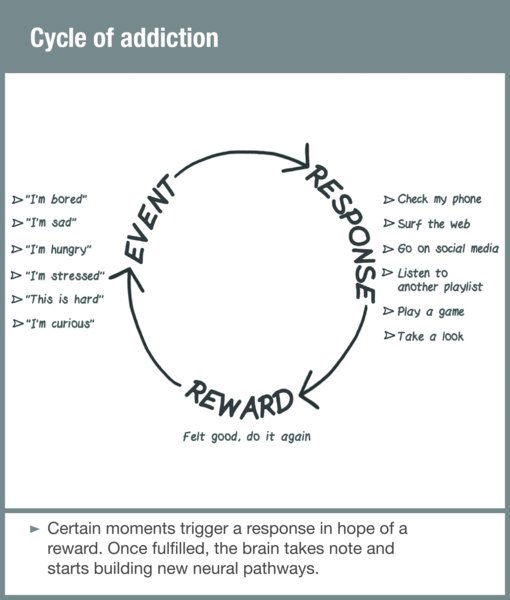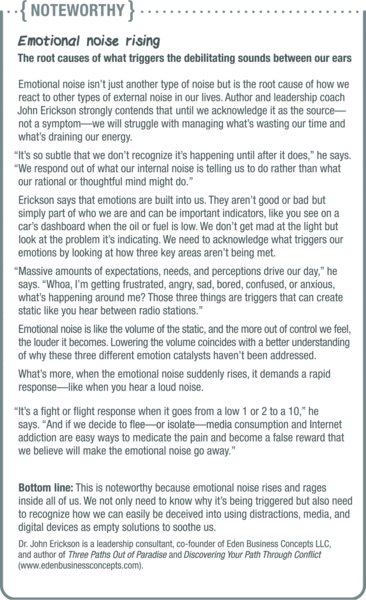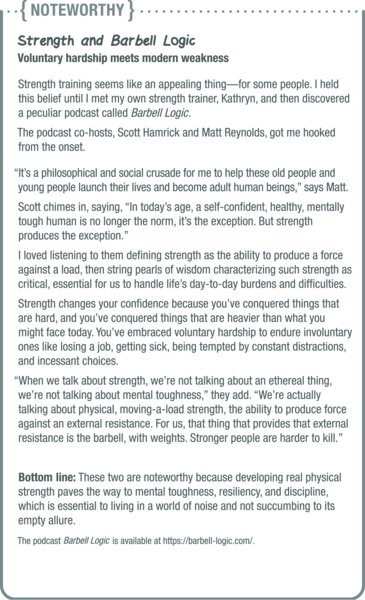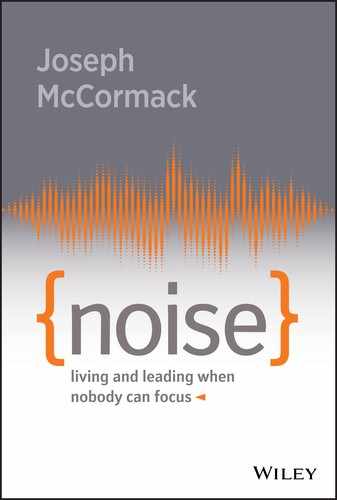Chapter 13
Saying No to Noise
There’s a famous saying, “There is no ‘I’ in ‘team.’” Now think about the word “noise.” There’s not only an “I” in it, but also an “n” and an “o.”
Is this pure coincidence or a sign? You decide.
“No” is a powerful little word. It can stop bad decisions, sudden impulses, unwanted offers, and debilitating tendencies. It is as unambiguous as it is direct.
Hear its power…
- No, thank you!
- No more for me
- No money in the account
- No time on the clock
- No excuses
- No clue
- No ifs, ands, or buts
- No pain, no gain
Just Say No
In the late 1980s, First Lady Nancy Reagan led the fight against drug addiction with her public plea to “Just Say No” to drugs. The point was clear and unwavering as a primary weapon in her fight against illegal narcotics, especially to youths.
She wanted to get current and future drug abusers to say the little word no to combat a growing epidemic of substance abuse. The catchphrase of her campaign was both straightforward and bold in its logic. The simple “just say no” message quickly spread through the culture in the days before social media.
In our widespread battle against the noise that’s both inside and all around us, the same phrase can be applied as a solution. Say no more often and drown out the noise in your life.
The Power of Self-Mastery
Too simple?
Not really. There is power in self-mastery. As old-school as it might sound, we have the power within us to choose what to tune out and when to tune in.
So, even though the “Just Say No” campaign on drug abuse didn’t succeed broadly, “Just say no to noise” can work for you on a personal level.
Repeat this simple declaration: I say no to noise.

Overcoming FOMO
One of the biggest challenges we all face is the fear of missing out, commonly called “FOMO.” We might feel something like this:
- “I’ve got to check that text right now because it might be important.”
- “I need to scroll indefinitely through my social media feeds because I might miss something.”
- “I have to check another option because I haven’t seen enough choices.”
- “I always have to be on e-mail because it’s expected I reply immediately.”
We all recognize that this behavior isn’t healthy, productive, or viable, but we all continue do it. We are afraid of missing out. It makes sense. Who wants to miss something that’s critical—an alert, a call, a breaking news story?
Yet, we all make a pact to search constantly through haystacks of useless information looking for the needle that might be there. It not only wastes valuable time but also trains our brains to respond immediately and impulsively to triggers with constant anxiety and senseless anticipation. FOMO is hard to resist.
No, Here’s How You Do It
How do you say no when you face the daily expectation to keep up? What is the risk versus reward for parents, managers, teens, and professionals?
Author Greg McKeown says essentialists believe that making things better means eliminating something. It’s true that in a great movie, many good parts have to be edited out. It’s true in writing that editing must be a ruthless practice.
Overcoming FOMO is a serious challenge that requires some strong virtues:
- Fortitude. An inner strength and courage to make frequent choices to miss out.
- Conviction. A commitment to embrace fewer, not more, things.
- Trust. An instinct that tells you what seems alluring and essential is probably just mindless noise.

Addictions Weaken Willpower
In a video about the addictive power of technology, Judson Brewer, one of the authors of The Craving Mind, describes how the brain is wired through a cycle of triggers to respond in order to achieve rewards.
He talks of feelings (e.g. fear, hunger, anxiety, isolation, etc.) that provoke impulses to achieve a promising resolution. For instance, he describes a moment of boredom that might prompt us to check our phone in hopes of finding something interesting and meaningful and, instead, encourages, “Just be curiously aware of what’s happening in your body and mind in that moment. It will just be another chance to perpetuate one of our endless and exhaustive habit loops or step out of it. Instead of seeing a text message, compulsively texting back, feel a little bit better, notice the urge, get curious, feel the joy of letting go and repeat.”1
This cycle, he cites, can create constant cravings—and instant rewards—over time, from which the brain makes powerful and permanent habits, ones that we might need to consciously try to break later on.
In essence, these triggered responses can become addictions that weaken our ability to resist.

In our own circumstances, the habit of turning to noise (e.g. giving into distractions, permitting interruptions, and embracing multitasking) all undermine our ability to focus and train our minds toward craving this impulsiveness, often completely unaware it’s even happening.
Before we can even think about saying no to an unexpected text alert, our minds desire another dopamine release that promises that the next message might mean we hit the big jackpot. It never comes true, but our minds trick us into thinking if we don’t check immediately, we might not win the lottery.

Running to Yes on the Road Toward No
Whether somebody offers you a donut or a distraction, it just feels better saying yes. Compare the taste and temptation of giving in versus the painful challenge of resisting and denying yourself.
It’s hard.
One of the most powerful things I have learned over the years is that when I have to say no to something, I need to be saying yes to something else. It’s a way for me to feel the positive power of yes being on my side in those tough moments.
Never was this more real than when I started running. Anyone who’s close to me knows that I hate running. Though I love sports and played soccer, basketball, and football competitively, running was never my thing. I hated the monotony of it.
Runners I know gave me countless reasons why they loved running, but I wasn’t buying any of it. I would never run, let alone call myself a runner. Yet, a few years ago, I started running seriously, and the sharp turn shocked people.
Why did I do it?
Building up that habit, filled with so many negative feelings and hard choices, meant that I had to fight to make it an intentional priority. With a busy schedule, I needed to find ways to resist complacency and the constant temptations to blow it off, not to mention to overcome my deep disdain for it.
So how did I get the power to say no to my wide variety of reasons to avoid running?
I found a simple, powerful reason to say yes as an offset. For me, it was tracking miles on an app. It felt like I was collecting gold stars as a simple reward, and it worked to keep me running for almost two straight years. What drove me was finding a reason to say yes while also having to say no to my internal arguments and laziness.
When it comes to saying no to noise, we have to say yes to something else.
Find your counterbalance.
Self-Control Is a Personal Way to Stop the Noise
When I was a kid, my dad had a million sayings. One of my favorites was “Let your no be no.” He taught me so many things; among them was a constant reminder of what truly makes us human is our ability to choose.
He would say that the two faculties of the soul are our intellect and our will: our faculties to reason and think along with our capacity to decide. That made so much sense to me, especially at a young age. As I got older, I started to see that emotions also occupy a third place in us as well.
Our willfulness plays a critical role in noise reduction.
There’s so much noise around us that disturbs, distracts, and defeats us. But being human means we can choose. It may not feel good to say no, and we might think and feel things that pull us in a different direction, but we can make that powerful little word work for us.
A decisive no can lead to noise abatement.
Impulse Management: A Few Daily Distractions
During the course of a day, there are so many moments when our minds get yanked around, latching onto things that really don’t matter much. It happens so frequently that you might not even notice how draining it can be.
Here are a few instances where you can practice impulse management:
- Passerby. You’re sitting at your desk reading an important e-mail and somebody approaches. Your curiosity awakens. Who is it? Oh, it’s so-and-so. Great, now you either have to say hi or pretend you didn’t see them. Back to work. Say no.
- Notifications. Bing, bing, bing. You hear the phone alert go off while talking to a friend. Maybe a text or a weather update. Like Pavlov’s dog, you instinctively pick up the phone and read the alert. You’ve lost your mind yet again—and maybe your friendship. Say no.
- Ideas. Walking across your house to get scissors, you start wondering if you have anything clean to wear tomorrow. You quickly cut to thinking of tomorrow’s appointment and recall you haven’t accepted the invitation yet. You grab your laptop and forget the scissors. Say no.

Feel the Peace of Singlemindedness
Set your mind to one thing at a time. Be convinced that this will build focus and bring peace. Use any one of the three previous examples and let yourself feel it: keep reading and finish the e-mail; hear the notification, but stay in the conversation; walk across the house and get the scissors.
Our minds want to focus on one thing at a time. Multitasking doesn’t bring peace of mind; it breeds a divided mind. As we become more aware of our awareness, we can flex our willfulness muscle more to embrace less. And when we do, we should remember to feel that feeling.
It’s a better way to be.
Five Small Steps to Make That Little Word a Big Part of Your Life
- Say it out loud. Hearing yourself say no is very different than thinking it. Tell someone, “No, I can’t talk to you right now” or “No, I am not interested.” Or tell yourself, “No, I’m done with checking e-mail for the day” or “No, I am not going to do four things at once.”
- Mute small distractions. Search for some simple, maybe silly things to avoid. Maybe it’s not changing a song to find a better one, putting your phone in the back seat while driving, or placing the TV remote control far away.
- Say yes to something else. Any distraction, interruption, or invitation to shift focus needs to be met not only with a sharp “no,” but also with a compelling “yes.” What is your personal reward when you resist more noise?
- Embrace your “why”—no excuses. Justifications, pretenses, and rationalizations to juggle more will get you nowhere. Decipher why succumbing to more noise will only debilitate you.
- Five out of seven isn’t bad. Don’t be a perfectionist. Avoiding noise all the time is improbable and unlikely. Dialing it down more to even half of the time will make your life better.
Rewind
- Do you notice yourself interrupting conversations or your work when you are distracted by alerts on your phone?
- Do you feel guilty if you say no to something even if you know you already have too much to do?
- What is one area of your life where you can immediately begin to practice willfulness?
[Brief Recap]
Saying no is a powerful expression of our willpower. Many of us have a fear of missing out, or FOMO, that can cause us to produce useless static in our lives. We need to say yes to tuning in, when we are saying no to tune out the noise.
{Tune-in}
By getting used to saying no to little things in life, we can reduce or eliminate lots of daily noise around us.
